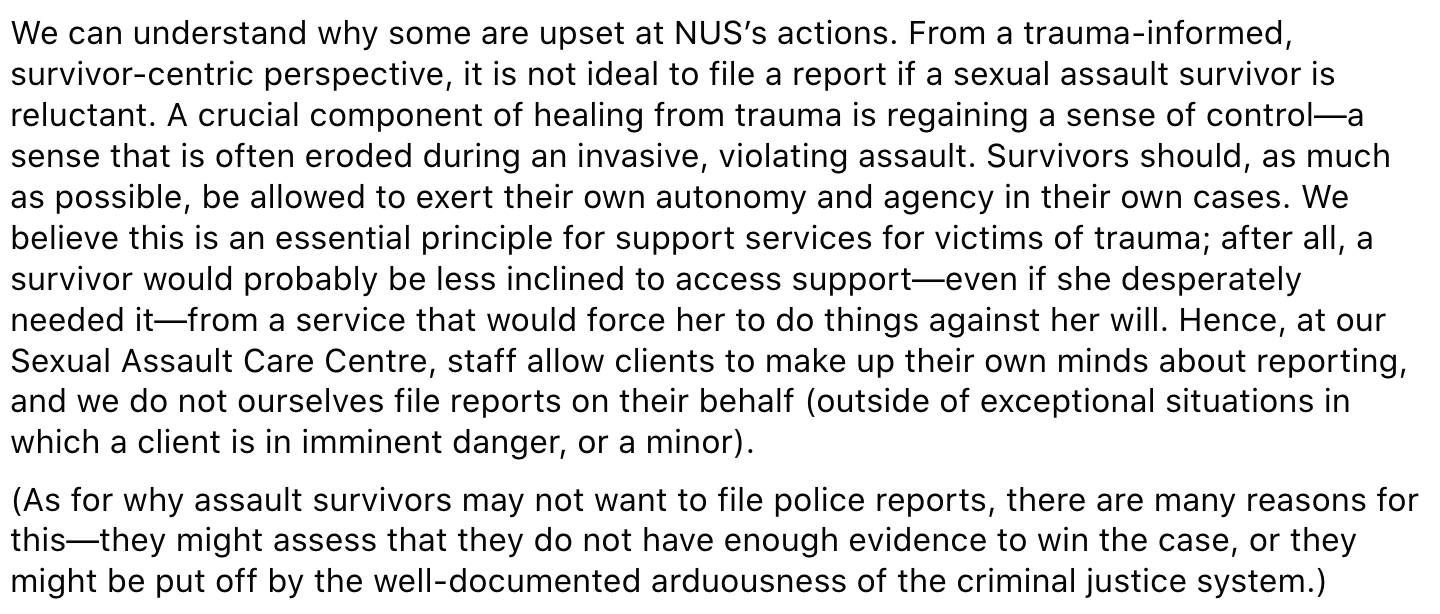If you’ve been on social media long enough, you should know that there’s the running joke that when news about sexual assault appears, people tend to say things like:
“Oh, if they were from NUS, they would have been able to get away with it.”
“Are they from NUS?”
“No more bright future ahead for them!”
And this time, the most recent scandal from NUS is about the ex-lecturer, Dr Jeremy Fernando, and how he was dismissed for sexual misconduct against two undergraduate students.
More details about the case can be read here.
Gaining back sense of control
While it’s definitely a good thing that the incident was brought to light, it would seem that NUS reported it to the police even though they were reluctant to do so.
While you might be thinking, “oh that’s ok, because in the end the guilty was exposed”, it’s actually not that simple.

AWARE Singapore, a non-profit organisation which advocates for gender equality, recently published on Facebook about their thoughts on the situation.
STATEMENT ON NUS TEMBUSU COLLEGE DON CASE AND MANDATORY REPORTING OF SEXUAL ASSAULTWe learned today that the National…
Posted by AWARE Singapore on Thursday, 22 October 2020
If you’re not in the mood to read, here’s a basic context: basically the post provides possible explanations as to why people are upset that NUS went to report this matter to the police without the survivors’ consent and why the survivors may not have wanted to file police reports.
From a survivor’s standpoint, it “is not ideal to file a report if a sexual assault survivor is reluctant”. That is because when healing from trauma, survivors need to regain back their sense of control.

If you do a search on Google why sexual assault survivors are reluctant to come forward, the answer is that there is no right answer because it’s complicated.
Mandatory Reporting
According to the post, AWARE pointed out that a possible reason why NUS went ahead with the police reports was because they may have been legally obligated to do so because of Section 424 of the Criminal Procedure Code.
Singapore Statues Online states that the person aware of the arrestable offence has the duty to report it unless they have a reasonable excuse not to do so.
AWARE also said that even with Section 424 in place, the act of reporting sexual misconducts is not widely practised.
More Transparency Needed from NUS?
When news of the lecturer being dismissed appeared, it took place two weeks after Dr Fernando’s dismissal. When NUS released their first statement on the matter, it lacked “clarity and accountability” according to a Facebook post by Students for a Safer NUS.
To conclude the post, AWARE brought up a few thought-provoking questions:
- Has mandatory reporting always been the university’s policy, and for what types of cases?
- Was this policy clear to the survivors from the start?
- Did the Victim Care Unit notify the survivors that the school would be filing a report?
- If the nature of the offence was criminal, as the police report suggests, why does NUS’s statement merely refer to an “intimate association with an undergraduate”? That would indeed be a breach of the university’s Code of Conduct for staff – but the survivors’ own accounts suggest something more akin to assault.
They then ended it with the statement that while it is commendable that NUS provided specialised support for the survivors and also prioritised their privacy and confidentiality, it would have been better to do it with “more clarity, sensitivity and consistent communication.”
What do you think?
Would you be jailed for being half-naked in public? Well, the answer will shock you. Seriously. Watch this to the end and you'll understand:



